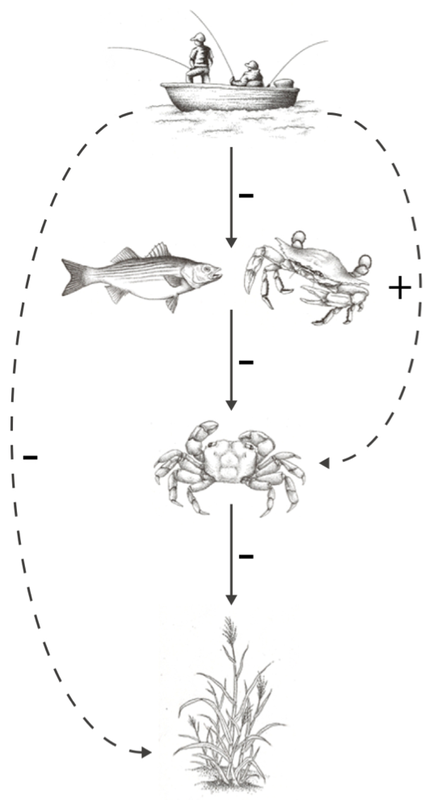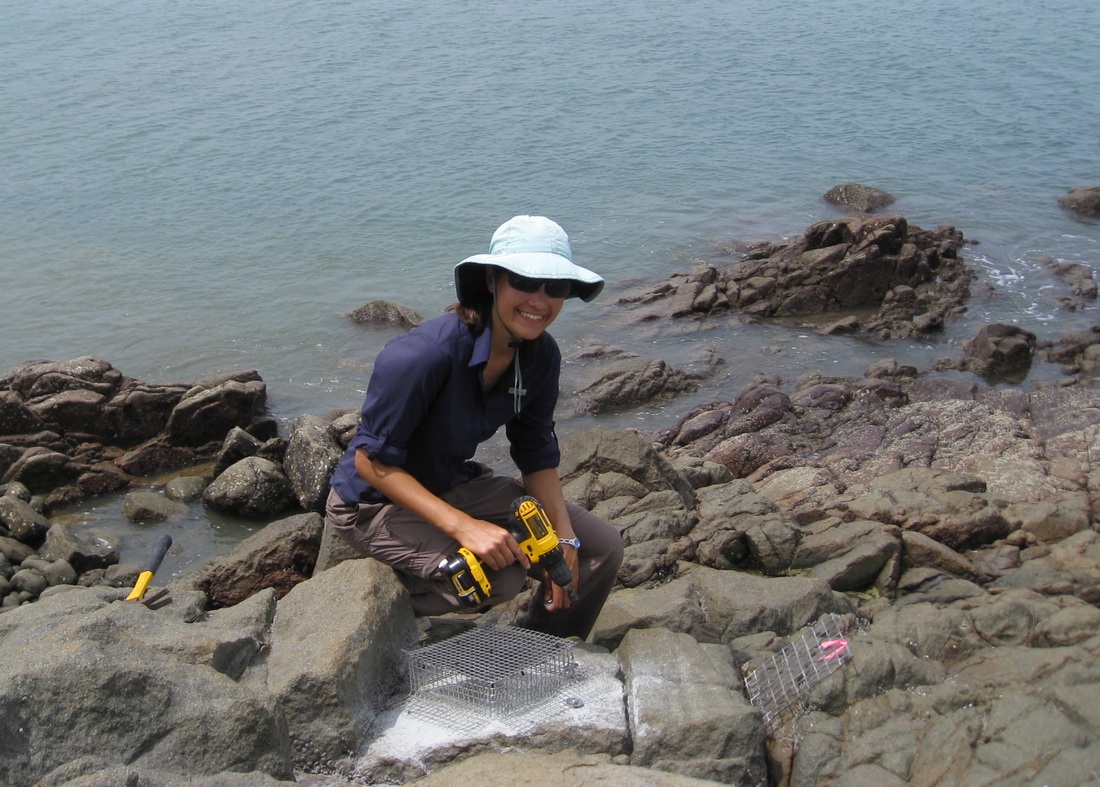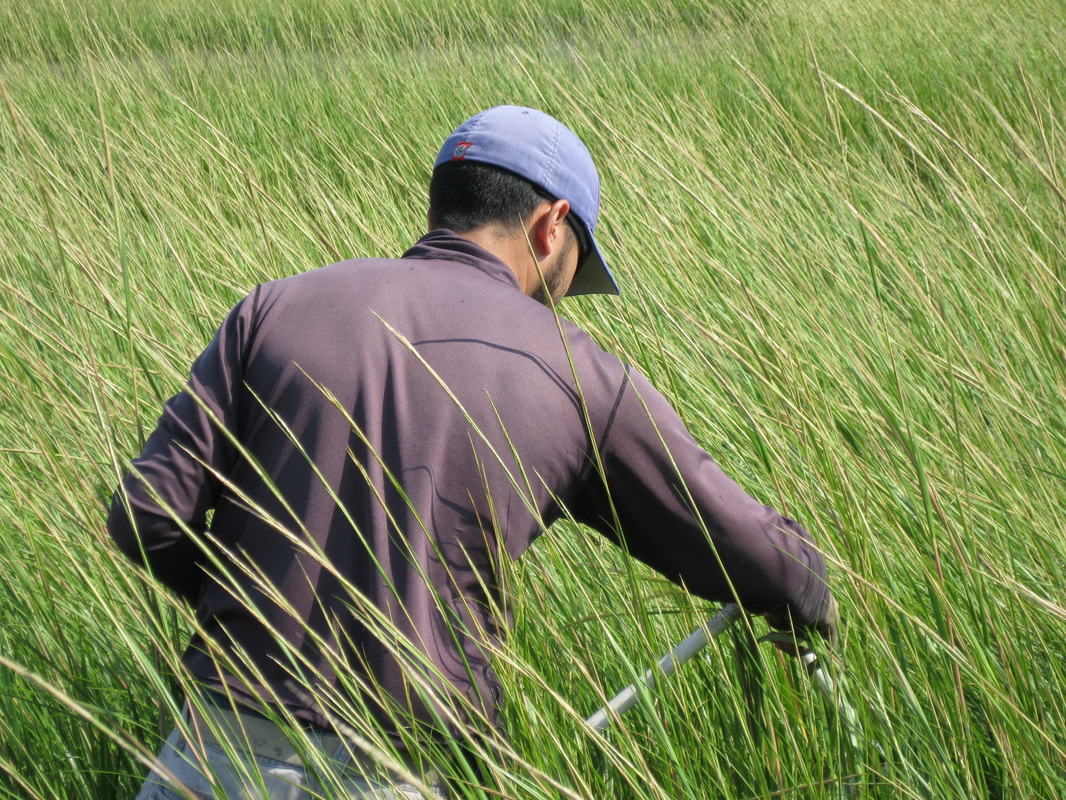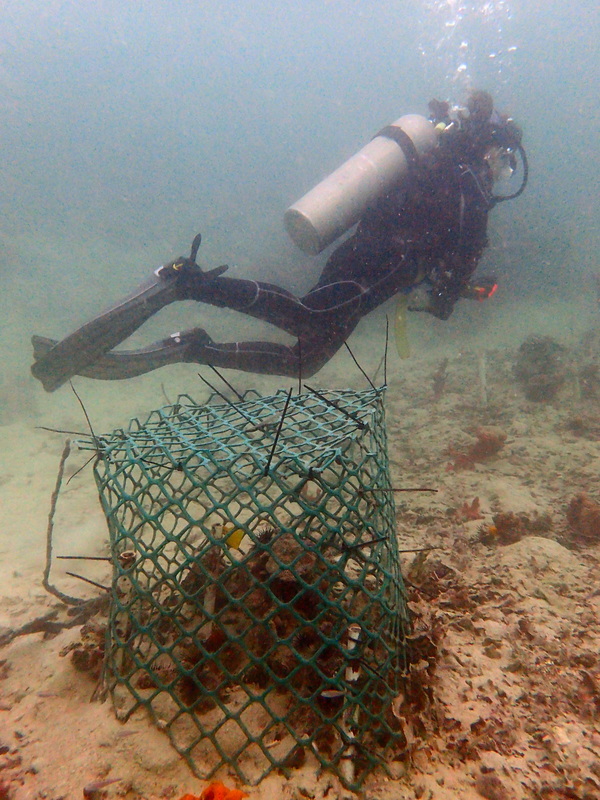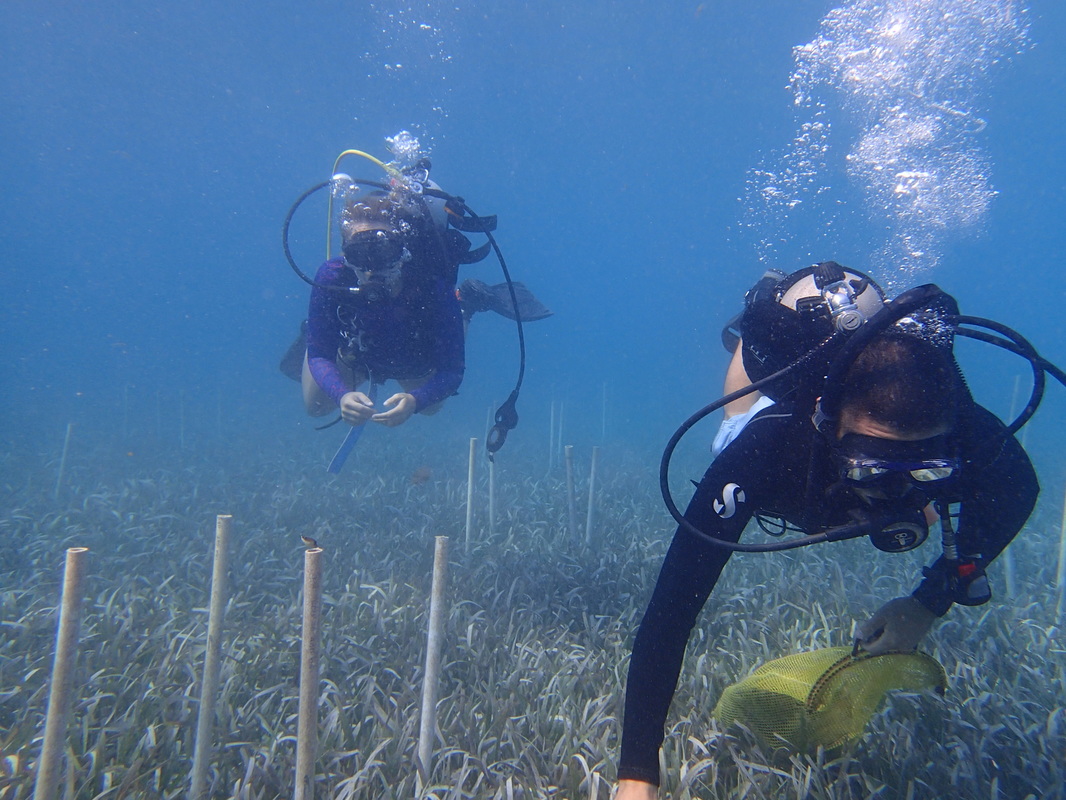Overfishing and consumer control
Our work with predators and grazers has revealed their critical role in driving patterns of community structure, habitat loss, and primary productivity. Often these consumer effects operate through indirect interactions, such as in salt marshes where we found that a trophic cascade led to loss of over 80% of vegetated shorelines. Surprisingly, we found that recreation fishing was responsible for the trophic cascade that caused marsh die-off, whereas attention to overfishing impacts has typically focused on commercial fishing practices. This suggests that recreation fishing is not as benign as previously assumed by both scientists and managers. Our subsequent research found rapid reversal of the marsh die-off trend, and experiments revealed that positive interactions among plants, and associated feedbacks, were responsible for the natural resilience capacity in marshes subjected to human impacts.
On rocky shores with more diverse communities of primary producers, we found that intertidal grazers can affect productivity by altering the relative abundance (aka evenness) of primary producers. Whereas previous work has focused on the number of species (richness), our work suggests that evenness can have important consequences for primary productivity independent of the number of species.
Much of our current research on the importance of top-down control is focused on the importance of consumers in moderating the dynamics of coral reefs, and we have ongoing work in mangroves and rocky shores as well. We also have a collaboration underway through the MarineGEO network to examine the relative importance of herbivores and nutrients in driving seagrass productivity. By conducting experiments across the greater Caribbean region from Panama to Florida, we are examining the context dependent outcomes of seagrass interactions.
Our work with predators and grazers has revealed their critical role in driving patterns of community structure, habitat loss, and primary productivity. Often these consumer effects operate through indirect interactions, such as in salt marshes where we found that a trophic cascade led to loss of over 80% of vegetated shorelines. Surprisingly, we found that recreation fishing was responsible for the trophic cascade that caused marsh die-off, whereas attention to overfishing impacts has typically focused on commercial fishing practices. This suggests that recreation fishing is not as benign as previously assumed by both scientists and managers. Our subsequent research found rapid reversal of the marsh die-off trend, and experiments revealed that positive interactions among plants, and associated feedbacks, were responsible for the natural resilience capacity in marshes subjected to human impacts.
On rocky shores with more diverse communities of primary producers, we found that intertidal grazers can affect productivity by altering the relative abundance (aka evenness) of primary producers. Whereas previous work has focused on the number of species (richness), our work suggests that evenness can have important consequences for primary productivity independent of the number of species.
Much of our current research on the importance of top-down control is focused on the importance of consumers in moderating the dynamics of coral reefs, and we have ongoing work in mangroves and rocky shores as well. We also have a collaboration underway through the MarineGEO network to examine the relative importance of herbivores and nutrients in driving seagrass productivity. By conducting experiments across the greater Caribbean region from Panama to Florida, we are examining the context dependent outcomes of seagrass interactions.
Selected publications
Xu, C., B.R. Silliman, J. Chen, X. Li, M.S. Thomsen, Q. Zhang, J. Lee, J.S. Lefcheck, P. Daleo, B.B. Hughes, H.P. Jones, R. Wang, S. Wang, C. Smith, X. Xi, A.H. Altieri, J. van de Koppel, T.M. Palmer, L. Liu, J. Wu, B. Li, Q. He (2023) Herbivory limits success of vegetation restoration globally. Science 382: 589-594.
Ashton, Gail V., A.L. Freestone, J.E. Duffy, M.E. Torchin, B.J. Sewall, B. Tracy, M. Albano, A.H. Altieri. . .G.M. Ruiz +56 others (2022) Predator control of marine communities increases with temperature across 115 degrees of latitude. Science 376: 1215-1219.
Boyd, A.D., N.S. Walker, S.R. Valdez, Y.S. Zhang, A.H. Altieri, V. Gulis, C. Crain, B. Silliman (2022) Invertebrate grazing on live turtlegrass (Thalassia testudinum): A common interaction that may facilitate fungal growth. Frontiers in Marine Science 8: 789380.
Knight, N.S., F. Guichard, A.H. Altieri (2021) A global meta-analysis of temperature effects on marine fishes’ digestion across trophic groups. Global Ecology and Biogeography 30: 795-810.
Sellers, A.J., B. Leung, A.H. Altieri, J. Glanz, B.L. Turner, M.E. Torchin (2021) Seasonal upwelling reduces herbivore control of tropical rocky intertidal algal communities. Ecology 102: e03335.
Cheng, B.S., A.H. Altieri, M.E. Torchin, and G.M. Ruiz (2019) Can marine reserves restore lost ecosystem functioning? A global synthesis. Ecology 100: e02617.
Cheng, B.S., G.M. Ruiz, A.H. Altieri, M.E. Torchin (2019) The biogeography of invasion in tropical and temperate seagrass beds: Testing interactive effects of predation and propagule pressure. Diversity and Distributions 25: 285-297.
Dunn, R.P., A.H. Altieri, K. Miller, M.E. Yeager, K.A. Hovel (2018) Contrasting behavioral responses to predatory risk cues reflect different foraging strategies in two Caribbean sea urchins. Marine Ecology Progress Series 604: 187-198.
Davidson, T.M., A.H. Altieri, G.M. Ruiz, and M.E. Torchin (2018) Bioerosion in a changing world: a conceptual framework. Ecology Letters 21: 422-438.
Campbell, J.C., A.H. Altieri, L.N. Johnston, C.D. Kuempel, R. Paperno, V.J. Paul, J.E. Duffy (2018) Herbivore community determines the magnitude and mechanism of nutrient effects on subtropical and tropical seagrasses. Journal of Ecology 106: 401-412.
Kuempel, C.D. and A.H. Altieri (2017) The emergent role of small-bodied herbivores in pre-empting phase shifts on degraded coral reefs. Scientific Reports 7: 39670.
He, Q., A.H. Altieri, B. Cui (2015) Herbivory drives zonation of stress-tolerant marsh plants. Ecology 96: 1318-1328.
Coverdale, T.C., E.E. Axelman, C.P. Brisson, E.W. Young, A.H. Altieri, M.D. Bertness (2013) New England salt marsh recovery: Opportunistic colonization of an invasive species and its non-consumptive effect. PLoS One 8: e73823.
Altieri, A.H., M.D. Bertness, T.C. Coverdale, E.E. Axelman, N.C. Herrmann, P.L. Szathmary (2013) Feedbacks underlie the resilience of salt marshes and rapid reversal of consumer driven die-off. Ecology 94: 1647-1657.
Coverdale, T.C., M.D. Bertness, A.H. Altieri (2013) Regional ontogeny of New England salt marsh die-off. Conservation Biology 27: 1041-1048.
Coverdale, T.C., N.C. Herrmann, A.H. Altieri, M.D. Bertness (2013) Latent impacts: the role of historical human activity in coastal habitat loss. Frontiers in Ecology and the Environment 11: 69-74.
Coverdale, T.C., A.H. Altieri, M.D. Bertness (2012) Belowground herbivory increases vulnerability of New England salt marshes to die-off. Ecology 93: 2085-2094.
Altieri, A.H., M.D. Bertness, T.C. Coverdale, N.C. Herrmann, C. Angelini (2012) A trophic cascade triggers collapse of a salt marsh ecosystems with intensive recreational fishing. Ecology 93: 1402-1410.
Bertness, M.D., C. Holdredge, A.H. Altieri (2009) Substrate mediates consumer control of salt marsh cordgrass on Cape Cod, New England. Ecology 90: 2108-2117.
Altieri, A.H, G.C. Trussell, P.J. Ewanchuk, G. Bernatchez, M.E.S. Bracken (2009) Consumers control diversity and functioning in a natural marine ecosystem. PLoS One 4: e5291.
Holdredge, C., M.D. Bertness, A.H. Altieri (2009) Crab herbivory driven die-off of New England salt marshes. Conservation Biology 23: 617-692.
Altieri, A.H. (2008) Dead zones enhance key fisheries species by providing predation refuge. Ecology 89: 2808-2818.
Xu, C., B.R. Silliman, J. Chen, X. Li, M.S. Thomsen, Q. Zhang, J. Lee, J.S. Lefcheck, P. Daleo, B.B. Hughes, H.P. Jones, R. Wang, S. Wang, C. Smith, X. Xi, A.H. Altieri, J. van de Koppel, T.M. Palmer, L. Liu, J. Wu, B. Li, Q. He (2023) Herbivory limits success of vegetation restoration globally. Science 382: 589-594.
Ashton, Gail V., A.L. Freestone, J.E. Duffy, M.E. Torchin, B.J. Sewall, B. Tracy, M. Albano, A.H. Altieri. . .G.M. Ruiz +56 others (2022) Predator control of marine communities increases with temperature across 115 degrees of latitude. Science 376: 1215-1219.
Boyd, A.D., N.S. Walker, S.R. Valdez, Y.S. Zhang, A.H. Altieri, V. Gulis, C. Crain, B. Silliman (2022) Invertebrate grazing on live turtlegrass (Thalassia testudinum): A common interaction that may facilitate fungal growth. Frontiers in Marine Science 8: 789380.
Knight, N.S., F. Guichard, A.H. Altieri (2021) A global meta-analysis of temperature effects on marine fishes’ digestion across trophic groups. Global Ecology and Biogeography 30: 795-810.
Sellers, A.J., B. Leung, A.H. Altieri, J. Glanz, B.L. Turner, M.E. Torchin (2021) Seasonal upwelling reduces herbivore control of tropical rocky intertidal algal communities. Ecology 102: e03335.
Cheng, B.S., A.H. Altieri, M.E. Torchin, and G.M. Ruiz (2019) Can marine reserves restore lost ecosystem functioning? A global synthesis. Ecology 100: e02617.
Cheng, B.S., G.M. Ruiz, A.H. Altieri, M.E. Torchin (2019) The biogeography of invasion in tropical and temperate seagrass beds: Testing interactive effects of predation and propagule pressure. Diversity and Distributions 25: 285-297.
Dunn, R.P., A.H. Altieri, K. Miller, M.E. Yeager, K.A. Hovel (2018) Contrasting behavioral responses to predatory risk cues reflect different foraging strategies in two Caribbean sea urchins. Marine Ecology Progress Series 604: 187-198.
Davidson, T.M., A.H. Altieri, G.M. Ruiz, and M.E. Torchin (2018) Bioerosion in a changing world: a conceptual framework. Ecology Letters 21: 422-438.
Campbell, J.C., A.H. Altieri, L.N. Johnston, C.D. Kuempel, R. Paperno, V.J. Paul, J.E. Duffy (2018) Herbivore community determines the magnitude and mechanism of nutrient effects on subtropical and tropical seagrasses. Journal of Ecology 106: 401-412.
Kuempel, C.D. and A.H. Altieri (2017) The emergent role of small-bodied herbivores in pre-empting phase shifts on degraded coral reefs. Scientific Reports 7: 39670.
He, Q., A.H. Altieri, B. Cui (2015) Herbivory drives zonation of stress-tolerant marsh plants. Ecology 96: 1318-1328.
Coverdale, T.C., E.E. Axelman, C.P. Brisson, E.W. Young, A.H. Altieri, M.D. Bertness (2013) New England salt marsh recovery: Opportunistic colonization of an invasive species and its non-consumptive effect. PLoS One 8: e73823.
Altieri, A.H., M.D. Bertness, T.C. Coverdale, E.E. Axelman, N.C. Herrmann, P.L. Szathmary (2013) Feedbacks underlie the resilience of salt marshes and rapid reversal of consumer driven die-off. Ecology 94: 1647-1657.
Coverdale, T.C., M.D. Bertness, A.H. Altieri (2013) Regional ontogeny of New England salt marsh die-off. Conservation Biology 27: 1041-1048.
Coverdale, T.C., N.C. Herrmann, A.H. Altieri, M.D. Bertness (2013) Latent impacts: the role of historical human activity in coastal habitat loss. Frontiers in Ecology and the Environment 11: 69-74.
Coverdale, T.C., A.H. Altieri, M.D. Bertness (2012) Belowground herbivory increases vulnerability of New England salt marshes to die-off. Ecology 93: 2085-2094.
Altieri, A.H., M.D. Bertness, T.C. Coverdale, N.C. Herrmann, C. Angelini (2012) A trophic cascade triggers collapse of a salt marsh ecosystems with intensive recreational fishing. Ecology 93: 1402-1410.
Bertness, M.D., C. Holdredge, A.H. Altieri (2009) Substrate mediates consumer control of salt marsh cordgrass on Cape Cod, New England. Ecology 90: 2108-2117.
Altieri, A.H, G.C. Trussell, P.J. Ewanchuk, G. Bernatchez, M.E.S. Bracken (2009) Consumers control diversity and functioning in a natural marine ecosystem. PLoS One 4: e5291.
Holdredge, C., M.D. Bertness, A.H. Altieri (2009) Crab herbivory driven die-off of New England salt marshes. Conservation Biology 23: 617-692.
Altieri, A.H. (2008) Dead zones enhance key fisheries species by providing predation refuge. Ecology 89: 2808-2818.
